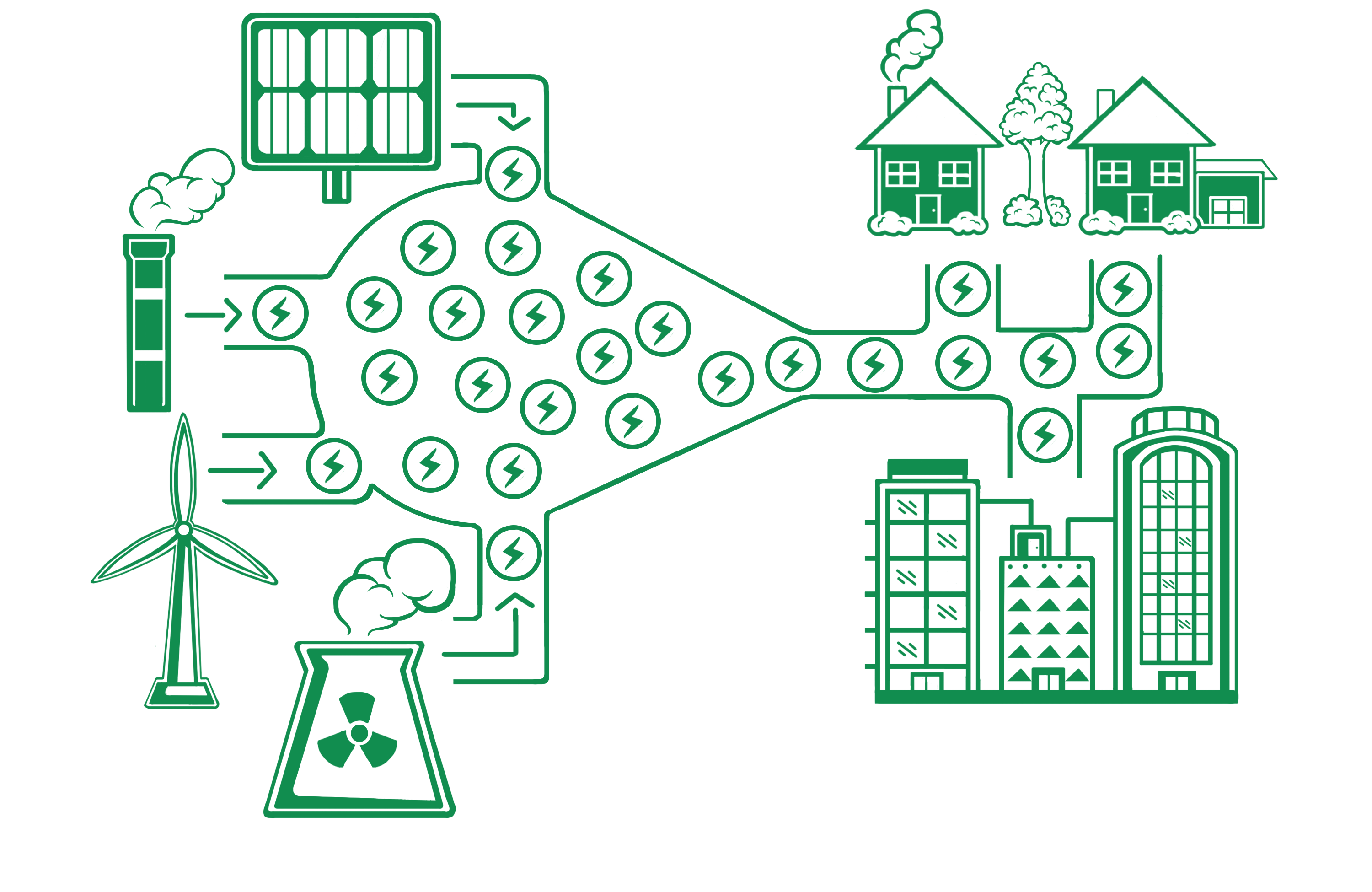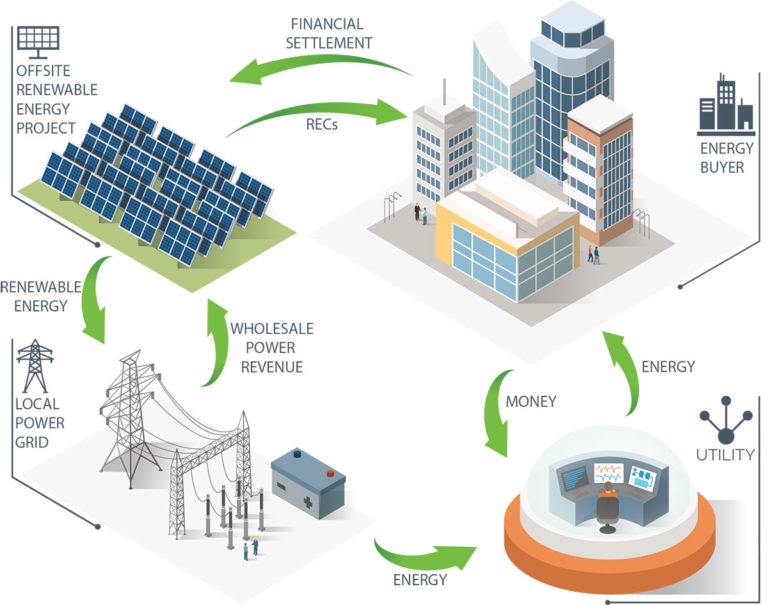RECS/ OFFSETS/ EFECS
F&D Partners continues to grow and succeed because we focus on the most important thing: Our Clients
Organizations aiming to decrease their emissions footprint possess several options for mitigation. These include implementing measures to reduce both direct and indirect emissions, such as enhancing energy efficiency and transitioning to green power. Additionally, organizations can opt to pay for external emission reductions. Understanding the distinctions between tools like Renewable Energy Certificates (RECs) and offsets is crucial in determining their respective utility for an organization.
What is an offset?
An offset project refers to a specific set of activities designed to decrease greenhouse gas (GHG) emissions, enhance carbon storage, or augment GHG removal from the atmosphere.
The project must meet the criterion of being deemed additional, and the resultant emissions reductions must be genuine, permanent, and undergo verification. Credits, known as offsets, issued for these verified emissions reductions must be enforceable.
These offsets can be applied to address both direct and indirect emissions related to an organization’s operations, such as emissions from a boiler used for heating the organization’s office building.
Essentially, the reduction in GHG emissions from one source can be utilized to “offset” emissions occurring elsewhere. Organizations have the option to purchase offsets to address their scope 1, 2, and 3 emissions. These offsets can complement an organization’s internal efforts to reduce emissions within its operational boundaries.
They are commonly employed to fulfill voluntary commitments to reduce GHG emissions, especially in situations where lowering an organization’s direct or indirect emissions is not practically achievable.
Why do Organizations Purchase Offsets?

For an organization voluntarily dedicated to reducing its emissions, F&D Partners emerges as an invaluable ally, offering comprehensive support in understanding, navigating, and strategically purchasing offsets—without resale—as a pivotal element in an overarching strategy for voluntary emissions reduction.
F&D Partners leverages its expertise to demystify the intricacies of the offset market, providing organizations with a nuanced understanding of offset projects, their criteria, and the verification process. By guiding organizations through the complexities of offset acquisition, F&D Partners ensures they make informed decisions that align with their sustainability goals.
This strategic approach not only complements ongoing efforts to decrease an organization’s direct and indirect emissions but also positions them to navigate the market effectively, secure genuine and enforceable emissions reductions, and contribute meaningfully to the broader commitment of voluntary emissions reduction.
What is a REC?
Renewable Energy Certificates (RECs) serve as legal instruments within renewable electricity markets to track and account for renewable electricity and its associated attributes, whether the renewable energy is generated on the organization’s premises or obtained from an external source.
A REC owner possesses exclusive rights to the attributes of one megawatt-hour (MWh) of renewable electricity and can make distinct claims linked to the renewable electricity tied to the REC.
These claims, such as using or being supplied with a MWh of renewable electricity, enable the reduction of the emissions footprint associated with electricity consumption. It’s important to note that claims to the attributes of electricity from a REC are exclusive to a single party. The intentional purchase or utilization of renewable energy, validated by RECs, reflects an organization’s commitment to sourcing electricity from renewable, low- or zero-emission sources, thereby mitigating market-based scope 2 emissions. Since the origin and generation details of the physical electricity received through the utility grid are unknown, RECs play a crucial role in providing accountability and assigning ownership to the attributes of renewable electricity generation and utilization.
Legally, RECs transfer the characteristics of renewable electricity generation, including its emissions profile, to the owner and form the basis for asserting a claim of consuming renewable electricity. Consequently, the REC owner holds exclusive rights to represent the quantity of their procured electricity associated with the RECs as zero-emissions electricity.

Why do organizations purchase RECs?
In the realm of achieving clean energy goals, F&D Partners plays a crucial role in supporting organizations seeking to navigate the Renewable Energy Certificates (RECs) landscape.
F&D Partners provides essential guidance to help organizations comprehend the versatility of RECs as a tool for reducing Scope 2 emissions tied to purchased electricity and actively contributing to the growth of the renewable energy market.
With a focus on strategic understanding and navigation, F&D Partners assists organizations in independently acquiring RECs, even decoupled from electricity, and aligning them with consumption patterns.
This becomes particularly advantageous for organizations operating in regions without local green pricing/marketing programs or facing a lack of policy support for direct engagement in renewable projects.
Are Offsets and RECs the Same?
While both offsets and Renewable Energy Certificates (RECs) contribute to lowering an organization’s emissions footprint, they serve distinct purposes, akin to tools in a sustainability toolbox. It’s crucial to recognize that offsets and RECs are not interchangeable but complement each other, each designed for specific tasks in the sustainability realm. When discussing REC purchases, avoiding the term “offset” clarifies the distinction between contractually fuel-switching to low- or zero-emissions electricity and paying for a global emissions reduction. Key differences include:
1. the unit of measure
Offsets are typically one metric ton of CO2-equivalent emissions, while RECs are based on 1 MWh of renewable electricity,
2. purpose
Offsets represent emissions reductions, while RECs support renewable electricity development), and
3. source
Offsets can come from various emission-reducing projects, while RECs are generated only from renewable sources like solar, wind, etc.
Buyers can claim emissions reductions with offsets and renewable electricity use with RECs, but careful wording is essential to avoid confusion. Offsets are used to negate an organization’s scope 1, 2, or 3 emissions, whereas RECs help lower market-based scope 2 emissions from purchased electricity. Notably, offsets must demonstrate additionality, proving real, permanent, verified, and enforceable reductions, whereas RECs do not require such proof when applied to an organization’s market-based scope 2 emissions.
The Additionality REC Market
Additionality RECs represent a proactive commitment to procure Renewable Energy Certificates (RECs) from upcoming pre-construction renewable projects. This commitment serves as a vital component of each project’s cash flow, aiding Project Developers in securing the necessary financing for new clean energy development. The approach combines the simplicity of unbundled RECs with the substantial impact akin to Power Purchase Agreements (PPAs) and Virtual Power Purchase Agreements (VPPAs).
How the AREC Market works
The AREC market operates through a structured process involving usage forecasting, planning, and budgeting.
Organizations estimate their annual electricity volume in megawatt-hours (MWh) and allocate a five-year plan for AREC strips.
This plan is then compared to spot RECs and Virtual Power Purchase Agreement (VPPA) options.
Upon agreeing to the terms of the AREC Market Purchase contract, organizations make purchase offers for each strip at their specified price.
Developers commit to selling, and Zettawatts, as the intermediary, allocates the volume accordingly. To secure their commitment, customers provide a 10% deposit of the total allocated volume at the agreed-upon price.
Once a project achieves Commercial Operation Date (COD), Zettawatts invoices the customer monthly and retires the Renewable Energy Certificates (RECs) in the relevant tracking system, completing the transaction within the AREC market framework.
The ARE Market offers a straightforward, low-risk, and highly impactful approach to addressing Scope 2 emissions. Additionally, Tax Credit Transfers can contribute to cost reduction while simultaneously supporting decarbonization efforts.


UNDERSTANDING EFECs: EMISSION-FREE ENERGY CERTIFICATES
To navigate towards a cleaner energy future, customers can strategically invest in the production of electricity generated from sources that eschew direct greenhouse gas emissions. This can be achieved through the procurement of carbon-free electricity. Emission-Free Energy Certificates (EFECs) serve as tangible representations of the emission-free attributes associated with various generation sources, including solar, wind, nuclear, and hydropower.
By choosing to source carbon-free electricity, your energy consumption is seamlessly paired with EFECs originating from these environmentally friendly energy sources. This symbiotic connection results in the delivery of carbon-free electricity to your operations and offers a multitude of benefits for your company:
- Emission Reduction Goals: Your investment in carbon-free electricity may significantly contribute to achieving your company’s emission reduction targets associated with annual electricity consumption. F&D Partners can provide expert guidance and customized strategies to ensure alignment with your specific goals.
- Advocacy for Emission-Free Generation: By opting for carbon-free electricity, your company actively supports and advocates for the utilization of emission-free generation sources. This not only reflects positively on your brand but also contributes to the broader sustainability narrative.
- Flexible Solutions: In situations where deploying onsite options might be impractical due to constraints in land or capital, sourcing carbon-free electricity offers a flexible and viable alternative. F&D Partners can assist in assessing your unique circumstances and tailoring solutions that align with your carbon-free goals.
In essence, with the expertise of F&D Partners, you will be propelled into a future where your energy consumption not only meets sustainability benchmarks but also serves as a beacon for a greener and cleaner tomorrow.
